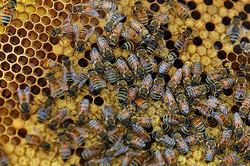 Experts are convinced that if no action were taken, the bees may expect the fate of mammoths. With all this, until the complete disappearance of the species remained absolutely slightly - less than 20 years. Experts are convinced that if no action were taken, the bees may expect the fate of mammoths. With all this, until the complete disappearance of the species remained absolutely slightly - less than 20 years.
Scientists around the world are sounding the alarm - bee populations are rapidly declining. President of the Russian Union of "beekeeping" Olga Chupakhin believes that measures should be taken immediately. Otherwise, the current generation may be the time when on the Earth there are no longer any bees.
"It is extremely sad, but the bees will die. And the main problem people on the planet, which in this profession is to prolong the process of death, to improve the environmental situation. To provide normal medicinal drugs, so that this death has something to cover. This is my subjective opinion. Mammoths no longer exist. And I think that, in 20 years, if we do not take almost no action, the bees may not be quite" - quoted expert "360 suburbs".
According to Cupfinal, in Moscow the problem is not yet acquired threatening proportions, but local beekeepers already started to fix the annoying tendency. "In the suburbs, compared with the whole country the number has not declined dramatically, 10-15% mortality of bees. But Russia is a shocking number of 30-40%. But the death of bees is observed everywhere, not only here. This is connected with the environment in General, and electromagnetic radiation, and towers, there are a lot of theories," says the President of the Russian Union of "beekeeping".
Note that overseas the situation is no better. As we were informed Days.<url>, April 2014 beekeepers and entomologists have documented the killing of more than 40% of the bees in the United States. The most alarming characteristics observed in Oklahoma - died here 63.4% of insects. In Hawaii, this phenomenon is less pronounced just died here only 13.9% of the bees.
sections: Society, World News
|